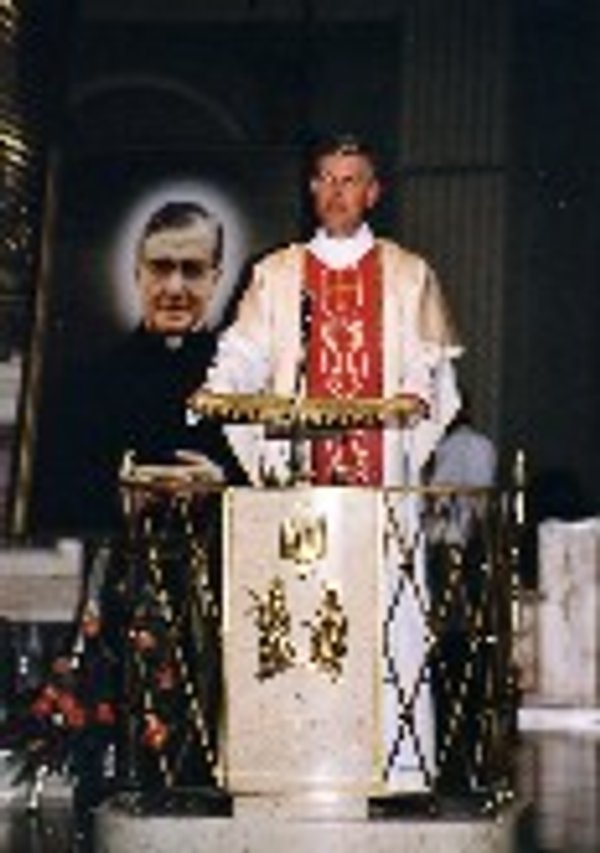Lately, more people than ever have been asking, “What exactly is Opus Dei”? Among the many possible answers one could give is this brief one: LEAVEN. Jesus Christ used that image to express the mission of the Church in the world. Since Opus Dei is a portion of the Universal Church, it comes as no surprise that the spirituality of Opus Dei mirrors this aspect of the Christian mission: to sanctify the world from within, like leaven.
St. Josemaria loved to refer to the action of yeast when speaking of the presence of Christians in the middle of the world. We have been placed by the Lord in the very midst of society, just as leaven is inserted into the dough. Through our daily contact with colleagues, friends and neighbours, we gradually help all around us to “rise”, to work with a vision of faith, to aim for the highest aspirations of our soul.
In order to produce a quality loaf of bread, special ingredients are needed. The expert chefs here this evening all have their favourite recipes. In the case of the leavening action of the laity, there is a crucial ingredient that we can focus on this evening: secularity.
Secularity is vital for the effective presence of the Christian in the middle of the world. The word "secularity" comes from the Latin term that means “world”. Let us look briefly at three characteristics of secularity: great love for the world without being worldly; an intense life of prayer; and a thirst for continually deepening our doctrinal/religious formation.
First, an intense love for the world, since it comes from the hands of our Father God. St. Josemaria offers the following consideration in his book, Forge:
The Lord wants his children, those of us who have received the gift of faith, to proclaim the original optimistic view of creation, the love for the world that is at the heart of the Christian message.
So there should always be enthusiasm in your professional work, and in your effort to build up the earthly city. (Forge n. 703)
We feel very much at home in the world, precisely because our Father God has created it. The Lord considers the world as his vineyard and has placed us there in order to cultivate it. You will recall the words of the Second Vatican Council: "By reason of their special vocation it belongs to the laity to seek the kingdom of God by engaging in temporal affairs and directing them according to God's will." (LG n. 31). Secularity leads us to consider the important issues of our society as our issues, and leads us to express our convictions with confidence, even when our ideas might not be in fashion at the moment.
Which brings us to the second element of secularity: an intense spiritual life. If that small quantity of leaven hopes to make the dough rise, it must be brimming with life. We, too, must be truly alive with God's grace in order to spread that life around us. Our mere physical presence is not enough to transform our surroundings.
One day in the early ‘60’s when the Second Vatican Council was in session, several Council fathers were dining with St. Josemaria at the central house of Opus Dei in Rome. One of the bishops was speaking about an idea that was circulating in the Council: that it is up to the laity to exert a Christian influence in the structures of the temporal order, in order to transform them. St. Josemaria listened with great enthusiasm and at a certain moment added with a twinkle in his eye: “Only if they have a contemplative soul, your Excellency! Otherwise, they won’t transform a thing. Rather, they will end up being transformed. And instead of christianizing the world, Christians will become worldly.” (AVP III, p. 490).
Herein lies a great part of the work of Opus Dei: we enliven the leaven, so to speak, by showing people of all walks of life how to acquire a deep life of prayer. Some people are sceptical when they first hear of this approach. They can't believe that it is possible to integrate a life of prayer with a demanding schedule. But many of us here this evening have discovered that it is not only possible to weave together prayer and work, it is indeed absolutely necessary to do so. Thus, the importance of the various spiritual activities organized by Opus Dei: Evenings of Recollection at our centres or in such places as St. Patrick’s Basilica; retreats at Le Manoir de Beaujeu in Coteau-du-Lac; personal spiritual direction. The goal of these activities is that we may have spiritual life in abundance.
Let us consider a third and final element of secularity: knowledge. Given that the Lord has sent us to reorder the temporal order according to his plan, we need to know that plan in great depth. Health care professionals require a profound knowledge of medical ethics; university students need to grasp the doctrine of the Church so that they can transmit it to their classmates and confidently respond to veiled or open attacks against the Church. Those involved in the business world cannot be satisfied with shortsighted decision making simply because it’s the way everyone else does it. They must be ready to change the way business decisions are taken, and that requires an ongoing effort to learn the principles of business ethics. The faithful of Opus Dei are actively organizing courses to study these important topics all over Montreal and throughout Canada.
Remercions Dieu d'avoir suscité un saint tel que Josémaria. Grâce à son zèle sacerdotal et à sa mentalité laïque, il continue d'inspirer à des milliers de fidèles de se donner à Dieu au milieu du monde pour en être le levain.
